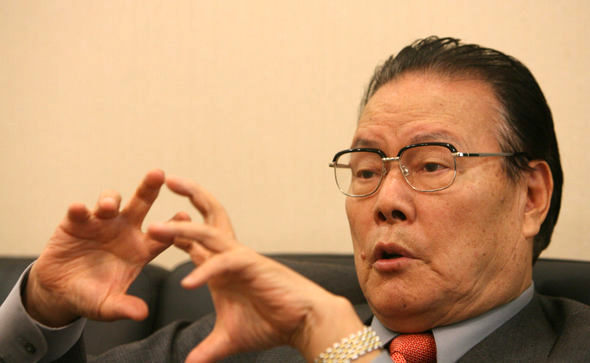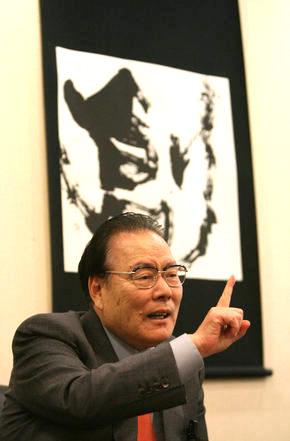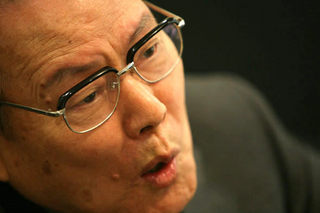
Lee O-young: We must inform the world about the proud fusion culture of the Korean Peninsula

Lee Sang-ki:This is an interview conducted in April 2007 with Lee O-young, Korea’s leading scholar and of the most intelligent people of his time who has passed away after a battle with cancer.
The interview was conducted while he was at the Hankyoreh.
He returned to Christianity after losing his eldest daughter, Pastor Man-ah Lee in 2012, and said that “the final destination of intellect is spirituality”.
“I realized later that everything was a gift. Like this life I received as a gift from the universe, everything I thought I could achieve with my own strength was a gift.”
However, I dare to say that he was a person who did not let go of his intellect or neglected it, but upgraded it to higher levels by sublimating it to spirituality.
SEOUL: There was no hesitation. The eloquence, logical eloquence, and tireless passion that transcends East and West. Because of that, the ‘2012 Yeosu Expo Bidding Committee’ must have desperately requested his help.
Ewha Womans University Professor Emeritus Lee O-young said that he would do his best once again following the 1988 Olympics to host the event, which will be decided in Paris in November.
I met Professor Lee to hear the significance of the Yeosu Expo in the world and civilized history.

※ What will Korea show the world through Yeosu Expo?
= Korea has two characteristics.
One is to become the noisiest and popping country in the hermit country, the central country. In the past 100 years, few countries have attracted the attention of the world as much as Korea since it has undergone such drastic changes. China and Japan were already well known, but Korea was marginalized from the world system. Korea has recently become the country that is receiving the most attention through semiconductors and the like.
Second, it is the only G7, G10, or Olympic host country that has not invaded or colonized other countries. In modern history, most of the powerful and prosperous countries provided their source of wealth through aggression. The ruins of the tin cans on June 25th seem like yesterday, but Korea is at the center of the world without us even realizing it. Korea is a country where East and West faced each other during the Cold War and hot war, where the continental powers and the maritime powers led by artillery collided and grew and developed. Korea is a weather vane that can read the world’s meteorological map, and stands at the center of a large flow that can predict the future as a thermometer and seismometer. People around the world know about the Balkans, but they don’t know about the Korean Peninsula yet. The world will know about this proud Korea through the Expo.
※ What aspects of Korean culture and history do you think are appealing to foreigners?
= Exhibition, or exposition, reveals what is hidden. Yeosu Expo will showcase the strengths of our culture. There is no country without Koreans in more than 180 countries around the world. It is the highest level in the world. Our DNA is arranged to make relationships with other countries and to live in a foreign country. Korean culture developed a fusion culture, that is, a culture of mixing. Let’s look at the fermentation culture represented by kimchi. Fermented food, a special food culture unique to Korea, is halfway between cassava food and raw food, and has both advantages.
The house is also characterized by a mixture of the southern style of the floor and the northern style of the ondol. There is a mixture of the southern style of jeogori, where clothes can be taken off easily, and the northern style of tying them up like a Daenim.
The geopolitical element of the peninsula has made Korea a cultural buffer zone. It is the peninsula where solutions and convergence take place. The slogan of the 1988 Olympic Games that I proposed, “Beyond the Wall” is the spirit of Korea. With the Seoul Olympics as an opportunity, we were able to break down the barriers of ideology, rich and poor, men and women, and language.
As the topic moved to the Seoul Olympics, he gestured with excitement and continued his explanations.
※Since it has already been released, please tell me a story about that time. The hosting of the 1988 Olympic Games seems to have some significance to the Yeosu Expo.
= I came up with a lot of ideas while participating as an advisor at the time, and most of them were actually reflected.
I’ll only list a couple of things. One million people gathered on the banks of the Han River on the opening day. And at Jamsil Sports Complex, a scene of a six-year-old child rolling a hoop was broadcast all over the world.
I came up with this idea in the sense of contemplating together with the people of the world what kind of world a six-year-old boy should create when he grows up and the miracle of the Han River achieved even after going through the war.
These messages of reconciliation, convergence, communication, and integration were delivered to the world through the Seoul Olympics. (He said that at the time, Yoon Tae-woong, a boy with a hoop, said that he had become a theater actor and was proud that the boy who symbolized the 1988 Olympics grew up upright and took on a job where he was applauded. Professor Lee says he still exchanges emails with Yoon these days.)
What made a child roll the hoop in an empty playground was to convey a different message through ‘silence’ instead of ‘fuss’ and ’emptiness’ instead of ‘fullness’.
※Let’s go back to the Yeosu Expo. If we win the right to host, it will be held in Yeosu in 2012. How do you see the meaning of 2012?
= By that time, as the new millennium has passed by more than 10 years, the transitional aftermath will be sorted out and the new millennium will be in full swing.
Based on 2012, it is necessary to look back on the Korean Peninsula 1,000 years ago.
In 1011, the Goryeo dynasty started modeling the Tripitaka Koreana to prevent the invasion of the Khitan by force. The Tripitaka Koreana, which is nothing more than a printing revolution, was a huge event like the Korean version of Google in today’s terms. To commemorate this, various international seminars are held in Korea in 2012, and the World Athletics Championships are held in Daegu the previous year. Although it has not been finalized yet, a world-class architecture festival is scheduled in Tongyeong. The year 2012 is when the world’s attention is focused on the Korean Peninsula Cultural Festival.

※What is the meaning of Yeosu as a geographical space?
= Yeosu is a kind of archipelago made up of about 400 islands. The archipelago culture is uniquely formed in the Yeosu area. Due to this geographical specificity, this area has the power to bring about changes from localism to globalism, from individualism to collectivism, and from alienation to unity. The characteristic of the archipelago is that it clearly shows how people who live ‘together but differently’ lead to happiness, and Yeosu has an advantage in that regard. The archipelago culture is characterized by showing creativity by leading fusion and reconciliation in conflict and confrontation. Look at Najeon Lacquer! When Westerners see clams, they eat only the flesh and throw away all the shells. But what about us? The hard shells are grinded and polished to make them look like a chest of drawers.
Let’s look at Byeoljujeon! The dragon king sends a tortoise to get a rabbit liver, and the rabbit evades the tortoise with a lie. . As seen here symbolically, the original land power and the sea power have always been at war.
Through Yeosu Expo, we will write a new story of buoyancy, that is, coexistence. Instead of a clumsy rabbit, I want to draw an honest rabbit. The principle of life is that even if there is so much water in the sea, thirst cannot be satisfied unless it is purified on land. A thousand years ago in the West, where the Mongolian soldiers swept away, only dust and blood were left behind, but on the Korean Peninsula, the Tripitaka Koreana was left splendidly. I am sure that will be the case after the Yeosu Expo.
※ On the 9th, the World Expo diligence team will visit Yeosu. Specifically, what are you going to show them?
= The organizing committee is making a lot of preparations. The slogan, ‘Let’s go behind industrialization but advance in informatization’ was created by me. That’s it. It would be enough to show the convergence of digital and analog, that is, a cutting-edge information society led by Koreans. If you see the BBB system translated into 17 languages, including Swahili, on your mobile phone, I’m sure they will be amazed at Korea. (BBB system is an abbreviation of Before Babel Brigade, which refers to a language and culture volunteer movement that dreams of relocating the Tower of Babel. During the 2002 Korea-Japan World Cup, with the idea of Professor Lee, about 2,300 people in 13 languages volunteered to interpret and translate. It relieved the language discomfort.)
※ There is a point that Asia also needs something like the European Union (EU). Organizations like the Asian Union (AU), for example.
= Absolutely necessary. However, as China and Japan did not make concessions to each other, the composition is not being formed. In the future, the world will be reorganized into a regional center rather than a country, leading to a global era. Many problems are being exposed in Asia as it achieves globalization while omitting easements at the national level.
First of all, it would be good if an AU with the character of a cultural community was formed. Then we can move on to the economic and technological community, and finally the political community. Expo Yeosu can be a catalyst for the formation of an Asian community.
Interview drafted by by Lee Sang-ki


